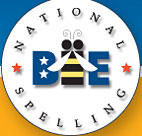After losing Internet connection for several days, I finally get to start posting Japanese Rules. There were a lot of Japanese words used at the National Spelling Bee this year, such as teppanyaki, haori, urushiye, and gagaku.
The long "a" sound is spelled ei or e. (examples: geisha, yosenabe, reiki)
The long "e" sound at the end of the word is spelled with an i or e. (examples: chorogi, gi, koji, Meiji, yakitori, momme, mume)
The long "i" sound is spelled ai. (examples: bonsai, kaiseki, yamamai)
The long "o" sound is spelled o. (examples: gyokuro, zendo, gingko)
The "oo" sound is spelled u. (examples: chanoyu, zaibatsu, shiatsu)
The "k" sound is spelled k. (examples: kakemono, bugaku, soba)
The schwa sound at the end of the word is spelled a. (examples: ikebana, kana, katana)
Words that have double consonants: hokku, issei, momme, seppuku, shikken, tenno, teppanyaki
Unfortunately, I do not know any songs in Japanese. Whenever I can, I will post more rules for the next origins. Continue studying and good luck!

No comments:
Post a Comment